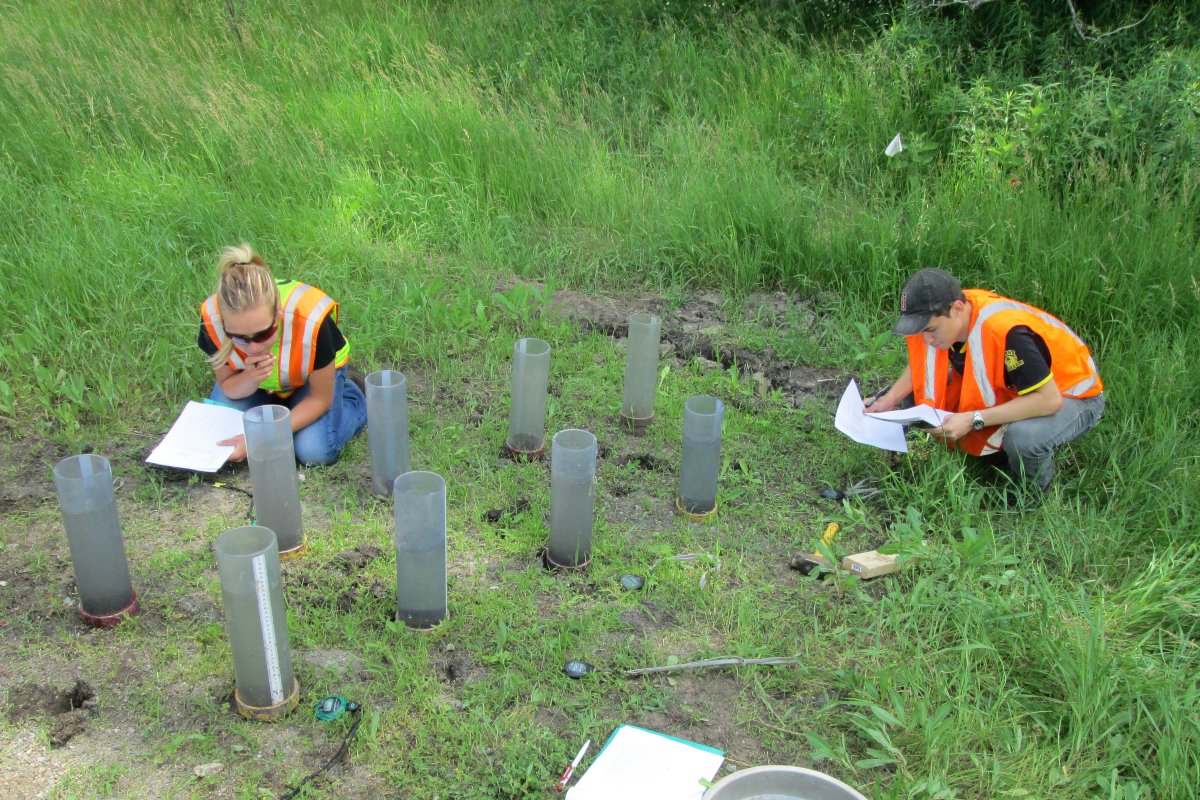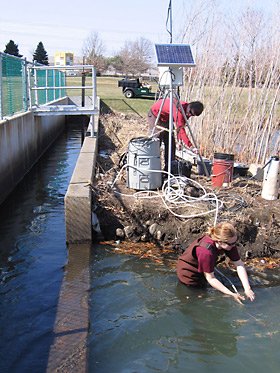Environmental Emphasis
The environmental engineering research program seeks innovative and sustainable solutions to soil-, air-, and water-related problems in natural and engineered systems.
Focus areas
Focus areas include the following:
- Environmental chemistry
- Water, wastewater, and stormwater treatment
- Water quality
- Soil and groundwater remediation
- Environmental microbiology
- Pollution prevention
- Energy and environment
- Air pollution
- Pollutant fate and transport
- Bioinspired materials for environmental applications
- Research may be laboratory, field, or computer model based.
Environmental engineering is a broad and interdisciplinary subject. The diverse backgrounds of our faculty and students and wide range of our current research projects reflect this breadth. Graduate students in our program have undergraduate degrees from civil or environmental engineering, chemical engineering, chemistry, biology and environmental science. Graduate enrollment includes about 30 full-time and 10 part-time students. Approximately half of the full-time students are in the Ph.D. program.
Students not only take courses in environmental engineering, but also in other departments, such as public health, public policy, chemistry, chemical engineering, microbiology, ecology, soil science, and mechanical engineering. Some of the activities that our students are involved with include Minnesota Environmental Engineering Students, Engineers Without Borders, and the 3-year dual masters program between Civil Engineering and the Humphrey Institute of Public Affairs. Environmental Engineering and Water Resources Engineering also offers a Master’s Sustainable Development Program.
Through a partnership with the Department of Civil and Environmental Engineering at the Norwegian University of Science and Technology (NTNU), M.S. and Ph.D. students have opportunities to take classes and conduct research at NTNU.
In addition to the program's full-time faculty members, faculty in other areas of the department have closely related research interests.
Faculty: Environmental engineering

Funding
Full-time students in environmental engineering are typically supported through one of three sources: fellowship funds, teaching assistant (TA) positions and research assistant (RA) positions. Most students in the program are supported through RA positions and include the project research in their theses.
Specific sources of research grants include: the National Science Foundation, USDA, DOE, USGS, NASA, the Department of Defense, AWWA Research Foundation, private companies (such as 3M), state agencies and local water utilities.
Typically a student who submits a standard graduate application to our program will be considered for all available funding opportunities. An exception is the Engineering the Future program.
Engineering the Future
The University of Minnesota is an approved institution for the Engineering the Future program. The program provides up to $20,000 in funding for master’s students in environmental engineering who agree to work for three years at the program’s sponsoring agencies following graduation. Master’s students are also eligible for teaching and research assistantships. Students must apply directly to the program. The deadline is Dec. 15.
Environmental Faculty
- William A. Arnold (Environmental organic chemistry, including the reaction rates and mechanisms of pollutants; and the development of treatment/remediation technologies.)
- Sebastian Behrens (Microbial processes for bioremediation of (in)organic environmental contaminants (mining wastes, agriculture runoff) and the recovery of valuable resources from municipal/industrial wastes.)
- Paul D. Capel (Adjunct. Environmental chemistry; transport and fate of organic chemicals in the environment; and the effect of agricultural modifications to the natural hydrologic system.)
- Xue Feng1 (Water Resources)
- Miki Hondzo 1 (Ecological fluid mechanics - fluid flow-biological interactions; water quality and transport processes in lakes, rivers, and watersheds.)
- Raymond M. Hozalski (Microbiological processes for water and waste treatment; water distribution system issues; surface water quality monitoring; and stormwater management.)
- Timothy M. LaPara (Biological wastewater treatment; microbial ecology; and environmental microbiology.)
- Paige J. Novak (Environmental microbiology; biological hazardous waste treatment; and the occurrence and treatment of endocrine disrupting compounds in water.)
- Boya Xiong (Environmental)
- Judy Yang (Water Resources)
Emeritus Professors
- Patrick L. Brezonik (Impacts of human activity on water quality and the biogeochemical cycles of important elements — nitrogen, phosphorus, trace metals — in large natural systems–watersheds and lakes.)
- John S. Gulliver 1 (Environmental fluid mechanics; mass transport in environmental systems; and flow and mass transport at hydraulic structures.)
- Michael J. Semmens (Physical and chemical processes for water and wastewater treatment, with an emphasis on membrane processes.)
- Heinz G. Stefan 1 (Environmental hydrodynamics and water quality modeling in natural and man-made water systems.)
Associated Faculty
- Dylan Millet (Associate Professor in the Department of Soil, Water and Climate; Resident Fellow Institute on the Environment)
- John Nieber (Professor in Department of Bioproducts and Biosystems Engineering)
- Matt Simcik (Associate Professor in the School of Public Health)
- Brandy Toner (Associate Professor in the Department of Soil, Water, and Climate)
- Bruce Wilson (Professor in Department of Bioproducts and Biosystems Engineering)
- Satoshi Ishii (Assistant Professor in the Department of Soil, Water, and Climate)
1 See also Water Resources Engineering
Environmental Engineering Courses
If you do not have a undergraduate degree in engineering, you will need to take these additional courses: (These courses will not count towards your degree)
- CEGE 4502 Water Wastewater Treatment
- CEGE 4522 Into Fluid Mechanics for graduate students
- MATH 2243 Linear Algebra and Differential Equations
Undergraduate Courses: (Will not count towards graduate degree)
- CEGE 3501 Introduction to Environmental Engineering
- CEGE 3541 Environmental Engineering Laboratory
- CEGE 4502 Water Wastewater Treatment
Advanced Undergraduate Courses/Graduate Courses:
- CEGE 4561 Solids and Hazardous Wastes
- CEGE 4562 Environmental Remediation Technologies
- CEGE 4563 Pollutant Fate and Transport: Processes and Modeling
- CEGE 5180 Introduction to Circularity Systems
- CEGE 5180 Environmental Field Methods
- CEGE 5541 Environmental Water Chemistry
- CEGE 5542 Experimental Methods in Environmental Engineering
- CEGE 5551 Environmental Microbiology
- CEGE 5552 Environmental Microbiology Laboratory
Advanced Graduate Courses:
- CEGE 8490 Data Quality
- CEGE 8500 Seminar: Environmental
- CEGE 8504 Theory of Unit Operations
- CEGE 8505 Biological Processes (Not Arnold)
- CEGE 8542 Chemistry of Organic Pollutants in Environmental Systems
- CEGE 8551 Environmental Microbiology: Molecular Theory and Methods
- CEGE 8553 Biofilms
- CEGE 8581 Research and Professional Ethics in Water Resource and Environmental Science
Graduate Courses in Related Fields:
- BBE 5753 Air Quality and Pollution Control Engineering
- CEGE 5543 Introductory to Environmental Fluid Mechanics
- CEGE 8503 Environmental Mass Transport
- CEGE 8561 Analysis and Modeling of Aquatic Environments I
- CEGE 8562 Analysis and Modeling of Aquatic Environments II
- CHEM 4601 Green Chemistry
- CHEM 5210 Materials Characterization
- CHEM 8011 Mechanisms of Chemical Reactions
- CHEM 8022 Computational Chemistry
- CHEM 8151 Analytical Separation and Chemical Equilibria
- CHEM 8152 Analytical Spectroscopy
- CHEN 5771 Colloids and Dispersions
- EEB 5601 Limnology
- HINF 5502 Python Programming Essentials for the Health Sciences
- LAAS 5621 Environmental Genomics and Microbiomes
- PA 5926 Presentation Skills: How to inspire your audience and change the world
- PUBH 7461 Exploring and Visualizing Data in R
- PUBH 7642 Advanced Programming and Data Analysis in R
- STAT 5302 Applied Regression Analysis
- WRS 5101/PA 5723 Water Policy
*Recommended courses are in bold*
